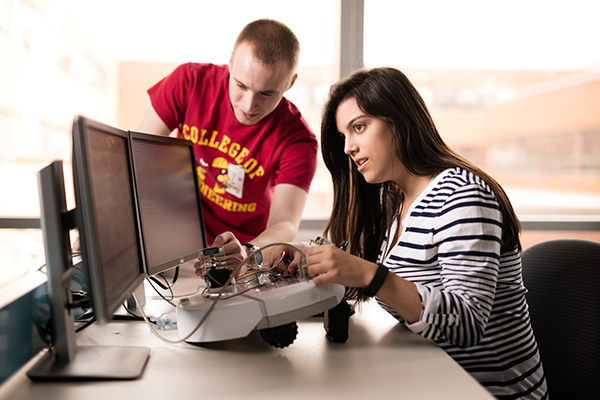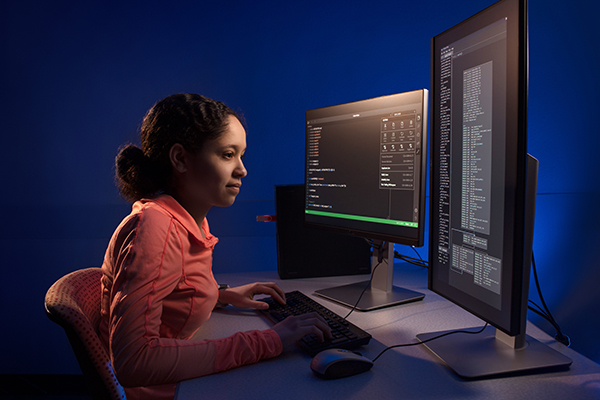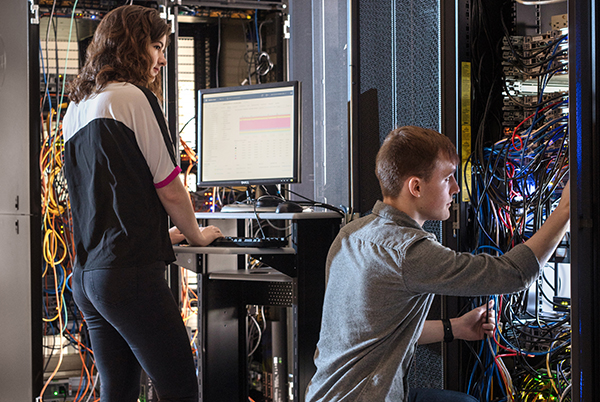All engineering majors use principles of science, math, and problem solving to create cost-efficient, reliable, and safe solutions to technical problems. Engineering is where science meets real-world applications to create products people need and things to make people’s lives better.
Electrical, computer, software, and cyber security engineers, as well as computer scientists, all create and improve technologies that help people, too. They work in health care, cell phone and computer manufacturing, and other industries, and all work on teams to do their work. But what is the difference among these majors at Iowa State? Here’s a brief overview to help you decide which major best fits your interests.
Computer Engineering
Computer engineering combines electrical engineering and computer science skills. Computer engineers design and develop computer systems and networks. They often solve problems at the hardware and software interface—such as how to get an application to do what you want it to do when you touch the screen of an iPad, or how to make sure the software that runs your car’s anti-lock braking system works with the car’s other systems and actually works when you hit the brakes.
Career opportunity examples
- Computer/embedded systems engineers
- Information security officers/analysts
- Network engineers
- Systems engineers
- Digital forensics investigator
Choose this if you like…
- Building computers and electronic devices
- Getting into the guts of smartphones, iPods
- Working with networking and/or security
Computer Science
Computer science is the theory and practice of processing and using information. Computer scientists use and develop algorithms, information processing, computer languages, and computer systems to solve computing problems. For more information on computer science, visit the Department of Computer Science website.
Career opportunity examples
- Computer programmers
- IT project managers
- Database experts
- Software developers
Choose this if you like…
- Figuring out how puzzles work
- Applying logic to computers/systems
- Writing programming code
Cyber Security Engineering
Cyber security engineers protect computer and networking systems from potential hackers and cyber attacks. They prevent cyber hackers from infiltrating data with their knowledge in the fundamentals of cyber security, computers, networks, and software systems.
Career opportunity examples
- Cybersecurity architect
- Penetration tester, performing simulated cyberattacks on a company’s computer systems and networks to help identify security vulnerabilities and weaknesses
- Cybersecurity product designer
- Integration of cybersecurity into devices
Choose this if you like…
- Helping protect people
- Solving dynamically changing problems
- Working in interdisciplinary teams
Electrical Engineering
Electrical engineers design and improve electronics. They work with energy in large-scale systems such as developing wind, solar, and other energy technologies that provide electricity to the world or wireless technologies that people use to communicate. They also work with small and even nano-scale energy to create circuits to run things like smartphones and MP3 players.
Career opportunity examples
- Power systems engineers
- Electric utility managers
- Hardware/electronics engineers
- Communications network engineers
- Biomedical engineers
Choose this if you like…
- Using electricity and renewable energy technologies
- Working with tiny circuits, devices inside phones, tablet PCs
- Seeing people use GPS navigation and medical imaging
Software Engineering
Software engineers design, build, and maintain software systems throughout the life cycle of the system. They often work with safety-critical software, such as software that runs flight control systems in airplanes, and they ensure that software systems are reliable, efficient, and affordable. In addition, they work to satisfy customer requirements. For more information on software engineering, visit the ISU Software Engineering page.
Career opportunity examples
- Engineering project managers
- Software architects
- Software consultants
Choose this if you like…
- Troubleshooting software problems
- Working with a team and with customers
- Seeing a product from beginning to end




